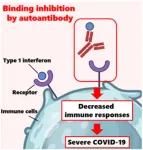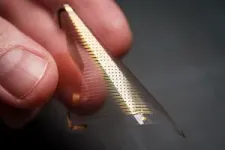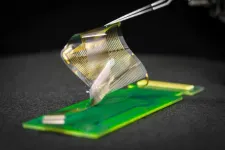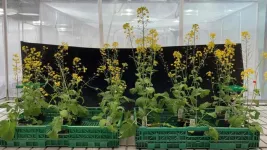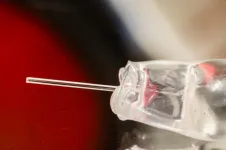(Press-News.org) Even though COVID-19 manifests as a mild and short-lived disease in most people, some suffer extremely severe symptoms; in the worst cases, these patients die due to complications such as respiratory failure or thromboembolism. It is well-known that factors such as age and underlying medical conditions like diabetes or immunodeficiencies increase vulnerability to severe COVID-19. However, some patients still experience severe COVID-19 without any apparent reason.
One possible explanation may lie in auto-antibodies, which are antibodies that erroneously target specific proteins produced by one’s own body. In normal circumstances, type I interferons (or ‘t1-IFNs’) play a crucial role in the body’s defense against viral infections; they interfere with viral replication and help mobilize the immune system. However, auto-antibodies against t1-IFNs can neutralize their activity, compromising the body’s defense mechanisms. While detecting these auto-antibodies was uncommon before COVID-19, there have been multiple reports of severe COVID-19 patients bearing them since the pandemic started. Could auto-antibodies targeting t1-IFNs be more common than previously thought?
To answer this question, a research team, including Lecturer Chiaki Iwamura from Chiba University, Japan, investigated whether and how auto-antibodies targeting t1-IFNs are related to COVID-19 severity by analyzing blood samples from 123 Japanese patients. Their findings were published in Volume 44 of the Journal of Clinical Immunology on April 22, 2024. This research was co-authored by Dr. Kiyoshi Hirahara and Dr. Koutaro Yokote from Chiba University, as well as Dr. Ami Aoki from Niigata University.
The researchers first conducted an enzyme immunoassay to detect auto-antibodies to t1-IFNs in the blood samples, and then confirmed whether these antibodies could effectively neutralize t1-IFNs in cell cultures. “We found that three out of 19 severe and four out of 42 critical COVID-19 patients had neutralizing auto-antibodies to t1-IFNs. Interestingly, there were no characteristic clinical features among patients with auto-antibodies to t1-IFNs,” comments Dr. Iwamura. In other words, there were no pointers in the data as to why some COVID-19 patients developed these auto-antibodies, even when considering previous infections, treatments received, and underlying immune disorders. “Based on these findings, it is difficult to estimate the presence of auto-antibodies to t1-IFNs from the usual blood tests and clinical background,” remarks Dr. Iwamura.
To shed some light on how auto-antibodies to t1-IFNs affected COVID-19 patients, the researchers then conducted RNA sequencing and B cell receptor analyses. These experiments showed that conventional dendritic cells and canonical monocytes, two types of white blood cells, exhibited attenuated IFN signaling for patients in which auto-antibodies were present. Moreover, B cells (yet another type of immune cell) in these patients had fewer SARS-CoV-2-specific receptors, implying reduced effectiveness in combating an infection.
Overall, these findings highlight the importance of looking at auto-antibodies to t1-IFNs in more detail when facing viral epidemics. “People with auto-antibodies to t1-IFNs are more susceptible not only to SARS-CoV-2 but also to common viruses such as influenza and to unknown viruses that may emerge in the future,” warns Dr. Iwamura, “Thus, we hope to collaborate with companies to develop a system to detect auto-antibodies to t1-IFNs in the blood. Ideally, we would develop a test to examine the presence of these auto-antibodies in regular health checkups so that people will be able to know whether they have them with little burden.”
Let us hope their vision becomes a reality soon so that we can be better prepared to diagnose, prevent, and fight viral infections.
About Lecturer Chiaki Iwamura
Dr. Chiaki Iwamura obtained a PhD from Chiba University in 2008, where he served as Assistant Professor from 2008 to 2012. He was a Fellow of the National Institutes of Health, and is currently a Senior Lecturer at Chiba University. His research focuses on immunology, infectious disease, and allergies. He has published over 45 scientific papers in these fields. He is also a member of the Japan Society for Immunology.
END
Could auto-antibodies be linked to severe COVID-19?
Researchers reveal auto-antibodies to type I IFNs block IFN signaling, contributing to severe COVID-19 by impairing the immune response
2024-06-19
ELSE PRESS RELEASES FROM THIS DATE:
Breakthrough UC San Diego brain recording device receives FDA approval for a clinical trial
2024-06-19
Video: https://youtu.be/-7ggs6e2UXI?si=lnFqEscjJh-91n64
B-roll: https://youtu.be/pvNBa733ICw?si=DotUuQkxVgMQ0jY7
The Federal Drug Administration approved a clinical trial to test the effectiveness of an electronic grid that records brain activity during surgery, developed by engineers at the University of California San Diego.
The device with nanoscale sensors records electrical signals directly from the surface of the human brain in record-breaking detail. The grid’s breakthrough resolution could provide better guidance for planning and performing surgeries to remove brain tumors and treat drug-resistant epilepsy.
The grid’s higher resolution ...
A study led by ISGlobal and IDIAPJGol recommends strengthening immunity against COVID-19 in people with cancer
2024-06-19
Researchers from the Institut d’Investigació en Atenció Primària Jordi Gol (IDIAPJGol) and the Barcelona Institute for Global Health (ISGlobal), a center promoted by “la Caixa” Foundation, have led a study on the effectiveness of vaccines against COVID-19 among cancer patients in Catalonia. The research, published in the journal Nature Communications, recommends administering additional doses of the vaccine among this risk population.
Cancer patients are at increased risk of death from COVID-19, especially ...
A railroad of cells
2024-06-19
Looking under the microscope, a group of cells slowly moves forward in a line, like a train on the tracks. The cells navigate through complex environments. A new approach by researchers involving the Institute of Science and Technology Austria (ISTA) now shows how they do this and how they interact with each other. The experimental observations and the following mathematical concept are published in Nature Physics.
The majority of the cells in the human body cannot move. Some specific ones, however, can go to different places. For example, in wound healing, cells move through the body to repair damaged tissue. They sometimes ...
Much of the Nord Stream gas remained in the sea
2024-06-19
Much of the methane released into the southern Baltic Sea from the Nord Stream gas pipeline has remained in the water. This is shown by measurements taken by researchers from the University of Gothenburg.
At the end of September 2022, the Nord Stream gas pipeline on the bottom of the Baltic Sea exploded east of Bornholm and one of the largest unnatural methane gas emissions ever was a fact. The methane gas from the pipeline created large bubbles at the water surface and measurements showed elevated levels of methane in the atmosphere.
Expedition ...
Dwindling arousal levels during brain scans have been distorting fMRI results, study shows
2024-06-19
In a new study, investigators from McLean Hospital (a member of Mass General Brigham), Harvard Medical School and the National Institute on Drug Abuse – Intramural Research Program (NIDA-IRP) discovered that the tendency of people’s arousal to wane over the course of brain scans has been distorting the brain connection maps produced by functional magnetic resonance imaging (fMRI). The team found that as people’s arousal levels dwindle during an fMRI, such as if they become more relaxed and sleepy, changes in breathing and heart rates alter blood oxygen levels in the ...
New Czech company linked to IOCB Prague to enter global gene therapy field
2024-06-19
Technology from the laboratories of IOCB Prague has been given an extraordinary opportunity to succeed in the rapidly developing segment of gene therapy. The results of successful research are set to be advanced by a newly established private company called Adalid Sciences, which is being supported with a major investment from BTL Group, a leading manufacturer of medical technologies.
The story begins with the discovery of new lipid nanoparticles with a comic book name coined by Dr. Petr Cígler and Dr. Klára Grantz Šašková of IOCB Prague. Acting as a sort of imaginary courier, their XMAN is capable of safely ...
New findings: East Palestine train derailment caused chemical pollution falling to the earth surface across the US and beyond
2024-06-19
A new study published in the academic journal Environmental Research Letters, reveals that the environmental impact of the February 3, 2023, Norfolk Southern train accident in East Palestine, Ohio covered a very large geographical area. Inorganic pollutants released due to the accident were found in wet weather downfall (wet deposition) from the Midwest through the Northeast reaching as far as southern Canada and North Carolina. The findings are significant as many inorganic pollutants in rain and snow have chemical effects on - aquatic flora and fauna. According to the paper, these pollutants spread over at least portions of 16 states and an area of 1.4 million ...
Interaction with insects accelerates plant evolution
2024-06-19
A team of researchers at the University of Zurich has discovered that plants benefit from a greater variety of interactions with pollinators and herbivores. Plants that are pollinated by insects and have to defend themselves against herbivores have evolved to be better adapted to different types of soil.
Plants obtain nutrients and water from the soil. Since different soil types differ in their chemical and physical composition, plants need to adapt their physiology to optimize this process on different soil types.
This evolutionary ...
More effective cancer treatment with iontronic pump
2024-06-19
When low doses of cancer drugs are administered continuously near malignant brain tumours using so-called iontronic technology, cancer cell growth drastically decreases. Researchers at Linköping University, Sweden, and the Medical University of Graz, Austria, demonstrated this in experiments with bird embryos. The results, published in the Journal of Controlled Release, is one step closer to new types of effective treatments for severe cancer forms.
Malignant brain tumours often recur despite surgery and post-treatment with chemotherapy and radiation. This is because cancer cells can “hide” deep within tissue and then regrow. ...
Ultrasound beam triggers ‘nanodroplets' to deliver drugs at exactly the right spot
2024-06-19
Conventional drug delivery is often like cracking a nut with a sledgehammer. Whether the drug is swallowed, injected, inhaled, or absorbed through the skin, it ultimately diffuses to most parts of the body, including those where it isn’t needed – or where it even might cause harm.
But what if the delivery could be targeted at exactly the right spot? This would allow the total dose to be dramatically lower, thus minimizing side-effects.
Now, scientists from the US have found a way to perfect a promising, ...
LAST 30 PRESS RELEASES:
Antipathy toward snakes? Your parents likely talked you into that at an early age
Sylvester Cancer Tip Sheet for Feb. 2026
Online exposure to medical misinformation concentrated among older adults
Telehealth improves access to genetic services for adult survivors of childhood cancers
Outdated mortality benchmarks risk missing early signs of famine and delay recognizing mass starvation
Newly discovered bacterium converts carbon dioxide into chemicals using electricity
Flipping and reversing mini-proteins could improve disease treatment
Scientists reveal major hidden source of atmospheric nitrogen pollution in fragile lake basin
Biochar emerges as a powerful tool for soil carbon neutrality and climate mitigation
Tiny cell messengers show big promise for safer protein and gene delivery
AMS releases statement regarding the decision to rescind EPA’s 2009 Endangerment Finding
Parents’ alcohol and drug use influences their children’s consumption, research shows
Modular assembly of chiral nitrogen-bridged rings achieved by palladium-catalyzed diastereoselective and enantioselective cascade cyclization reactions
Promoting civic engagement
AMS Science Preview: Hurricane slowdown, school snow days
Deforestation in the Amazon raises the surface temperature by 3 °C during the dry season
Model more accurately maps the impact of frost on corn crops
How did humans develop sharp vision? Lab-grown retinas show likely answer
Sour grapes? Taste, experience of sour foods depends on individual consumer
At AAAS, professor Krystal Tsosie argues the future of science must be Indigenous-led
From the lab to the living room: Decoding Parkinson’s patients movements in the real world
Research advances in porous materials, as highlighted in the 2025 Nobel Prize in Chemistry
Sally C. Morton, executive vice president of ASU Knowledge Enterprise, presents a bold and practical framework for moving research from discovery to real-world impact
Biochemical parameters in patients with diabetic nephropathy versus individuals with diabetes alone, non-diabetic nephropathy, and healthy controls
Muscular strength and mortality in women ages 63 to 99
Adolescent and young adult requests for medication abortion through online telemedicine
Researchers want a better whiff of plant-based proteins
Pioneering a new generation of lithium battery cathode materials
A Pitt-Johnstown professor found syntax in the warbling duets of wild parrots
Cleaner solar manufacturing could cut global emissions by eight billion tonnes
[Press-News.org] Could auto-antibodies be linked to severe COVID-19?Researchers reveal auto-antibodies to type I IFNs block IFN signaling, contributing to severe COVID-19 by impairing the immune response
